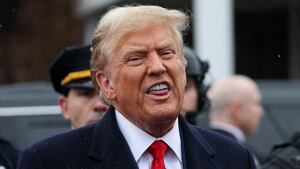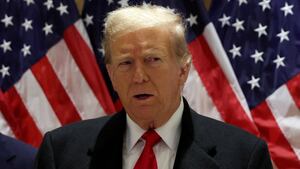A New York appeals court on Tuesday denied a last-ditch attempt by Donald Trump to delay his hush-money trial by suing the presiding judge over a gag order he placed on him.
It’s the second rejection by an appeals court in as many days for Trump, who has gotten desperate in his attempts to have his Manhattan trial pushed back from commencing Monday.
Cynthia Kern, the state appeals court judge, ruled that Trump’s lawsuit against Judge Juan Merchan wasn’t enough reason to postpone his trial. That case pertains to allegations Trump falsified records to hide the nature of payments to his former fixer, Michael Cohen, including an alleged payment to Stormy Daniels to cover up an affair she claims to have had with Trump.
Trump has fired off nasty attacks on Truth Social against Merchan and his family in recent weeks, alleging the judge is biased because his daughter works in political consulting with Democrats—attacks Merchan said forced him to expand a gag order against Trump to include his loved ones in addition to court staff, witnesses, and their families.
In court on Tuesday, attorneys for Trump argued the gag order was unconstitutional and illegally restricted him from critiquing the case and speaking freely to the voting public.
“The First Amendment harms arising from this gag order right now are irreparable,” argued Emil Bove, a Trump attorney.
Steven Wu, the appellate chief for the Manhattan District Attorney’s office, countered that the gag order is necessary to protect “the integrity of the trial” and those involved in it.
“What we are talking about here is the defendant’s uncontested history of making inflammatory, denigrating comments” about people involved in the case, Wu said. “This is not political debate. These are insults.”
Wu added that prosecutors have struggled to convince witnesses to testify because they fear what attacks may await them if Trump were to go after them online. He added that there is no precedent that suggests a criminal trial should be paused because a lawsuit was filed against the presiding judge by a defendant.
“There is no basis for staying a criminal trial based upon a challenge to a collateral order,” he said. “The criminal trial should proceed regardless of any stay they’re arguing for here. That is extremely important to us.”
In the end, Kern sided with prosecutors in the emergency hearing. Her decision means Trump can still have his request heard by a full panel of five appellate judges, but it’s unlikely a court would be able to act ahead of Monday, when Trump’s trial is slated to begin. If jury selection commences as planned next week, Trump will officially be the first former U.S. president to face criminal prosecution in a trial.
Tuesday’s decision came less than 24 hours after the appeals Judge Lizbeth Gonzalez ruled that Trump is not entitled to postpone proceedings while his attorneys try to have the trial moved from Manhattan—another desperate delay tactic that was shot down. That decision came after weeks of Trump bemoaning that a trial in deep-blue Manhattan would be inherently biased against him as a Republican presidential candidate.
Trump has had no luck in having his New York trial postponed, but his lawyers have successfully argued to have his other criminal trials—in Miami, Washington, and Atlanta—pushed back for different reasons.
With delays mounting elsewhere, Trump’s trial in New York may be the only one to commence ahead of the 2024 election this fall.








